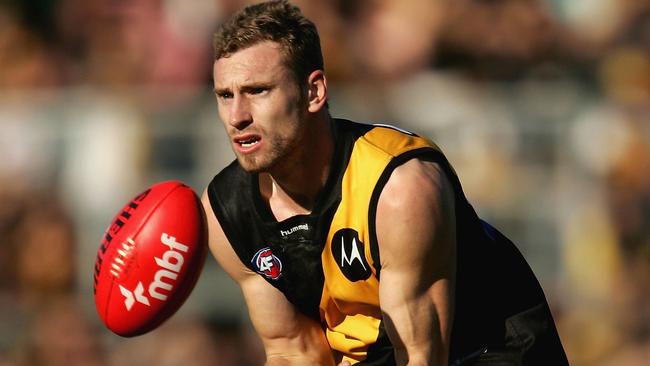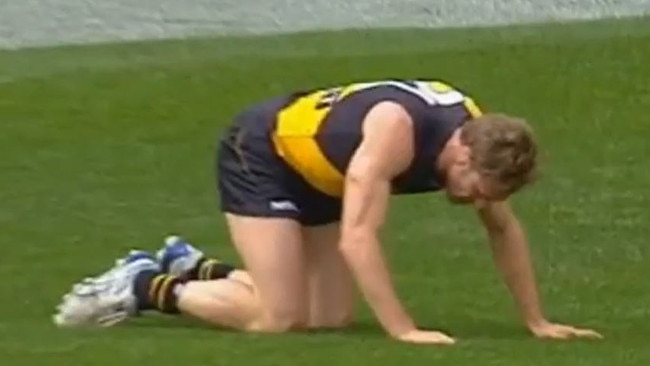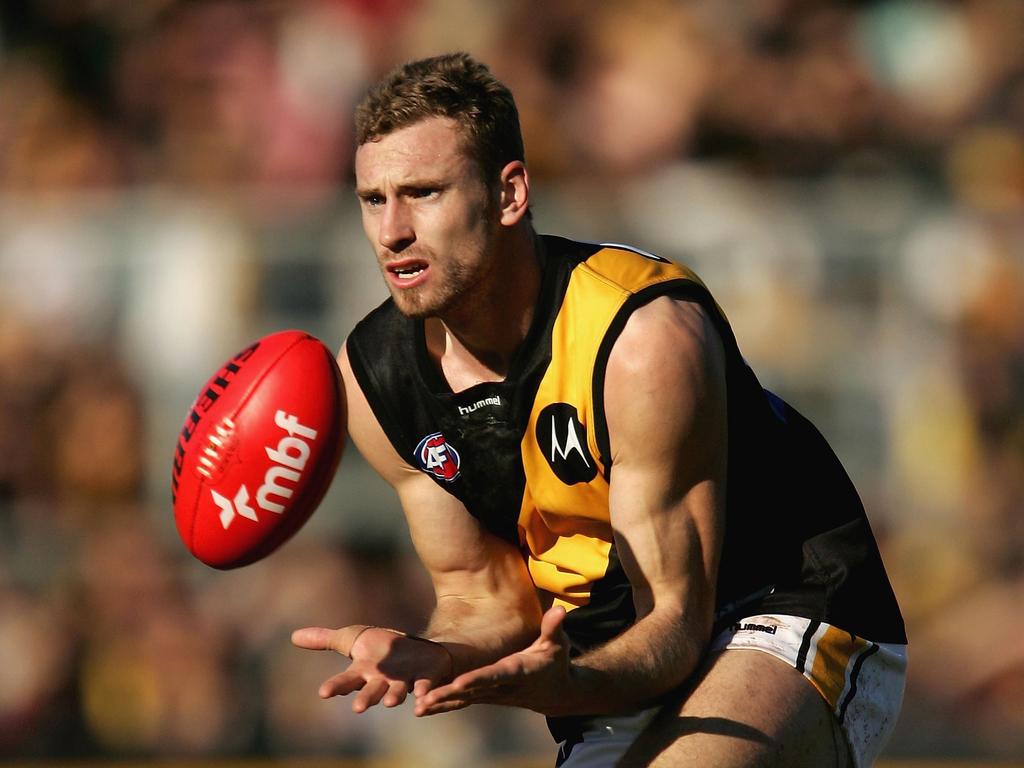Game changer: Inquest into Shane Tuck death tells AFL to overhaul concussion rules
The inquest into the death of former Richmond star Shane Tuck, at 38, ‘strongly urges’ a range of measures the AFL should introduce.

The AFL has been urged to radically overhaul its concussion rules, with the Victorian State Coroner explicitly recommending the AFL warn players about the risk of developing CTE from sub-concussive head knocks.
The findings are significant because the coroner shifted debate away from concussion to the accumulation of head hits that do not produce concussion symptoms, which a player receives over the course of their career.
The inquest examined the death of former Richmond star Shane Tuck, who took his life in July 2020, aged 38, after a long battle with mental illness.
He was diagnosed with “severe CTE” at post mortem at the Australian Sports Brain Bank. CTE is a dementia caused by cumulative effects of repetitive head injury.
The inquest heard Tuck was hearing voices telling him he was “no good”.
Tuck had previously attempted suicide and been involuntarily admitted to a psychiatric institution in the two years before his death.
He had a successful AFL career playing 173 games between 2003 and 2013.
Coroner John Cain Jr said he accepted the medical evidence that limiting exposure to repetitive head injury reduced a player’s risk of developing CTE.
The inquest on Monday heard evidence from the AFL that they accepted an “association between repetitive head injury and CTE”, a view that falls short of accepting causation.
In his evidence to the inquest, the AFL’s chief medical officer, Dr Michael Makdissi, defended the AFL’s failure to have a specific policy on CTE .
“CTE (was) important … but not the only thing we should be thinking about,” Dr Makdissi said.
He rejected the opinion of Dr Bob Cantu, the coroner’s expert witness and a world-renowned concussion and CTE expert, who said that while the AFL’s concussion protocols were “world-best practice”, they did not address the issue of repetitive head injury.
This was a “missed opportunity”, Dr Cantu said.
In written submissions, the AFL took further issue with this point.

Dr Makdissi described Dr Cantu’s statements as a “narrow construction” of the AFL’s concussion policies.
However, the coroner said the fact Tuck had CTE was “relevant to his death” and therefore it was “important to understand the current state of play in Australia with respect to CTE and to consider whether there is scope for improvements in player safety”.
Cain cited Dr Cantu’s evidence that CTE was “most closely correlated not with the number of concussions sustained but rather with the amount of repetitive head trauma someone has accumulated”.
Dr Cantu is part of the Boston University Centre for the Study of CTE and a member of the Concussion in Sport Group (CISG), which is sponsored by sporting organisations, including the AFL.
Dr Cantu is somewhat a dissident voice on the CISG and has been publicly critical of its failure to adequately address the risk of players acquiring CTE as a result of their participation in a sport where high-velocity body and head impacts are part of the game.
With this in mind, the coroner said the AFL should reduce full-contact training in order to reduce the amount of sub-concussive head injury – a bump to the head that doesn’t cause symptoms – players are exposed to on the field.
The coroner also “strongly urged” the AFL to introduce accelerometer mouthguards to 80 per cent of players in season 2024 to measure exposure to repetitive head injury.
Cain said this was “imperative in understanding repetitive head injury and invaluable in promoting brain health”.
CTE can only be diagnosed definitively at post mortem, but clinical symptoms in life include cognitive deficits, depression, anxiety and paranoia.

Former AFL players Graham “Polly” Farmer, Danny Frawley and AFLW star Heather Anderson were diagnosed with CTE after their deaths.
In another significant recommendation, the coroner urged the AFL to employ independent concussion spotters with the power to overrule club doctors where there was disagreement over whether a player should be removed from the game for a head-injury assessment. The AFL has long resisted this call.
The coroner recommended the AFL and the AFL Players’ Association “expedite and improve their communications” with past and present male and female players to “encourage them to donate their brains at end of life for further research”.
In 2020, the Victorian coroner investigating the suicide of former St Kilda star Danny Frawley recommended the AFL “actively promote” brain donation to the Australian Sports Brain Bank” in order to drive research into CTE.
However, the AFL disagreed with that and said it had its own brain-donor program under way.
That brain-donor program appears to have languished with only a small notice appearing in newsletters to AFL alumni on the issue.
Cain said the AFL should “include concrete information and education about the risks associated with repetitive head trauma including CTE that is delivered throughout a player’s career and beyond”.
The coroner also recommended the federal government adequately fund brain banks.
Australian Sports Brain Bank director Professor Michael Buckland told The Australian he was delighted with the coroner’s understanding of the issue.
“I was grateful the coroner explicitly addressed the relationship between CTE and repetitive head injury and did not confuse it as a purely concussion issue,” he said.
Prof Buckland said it was “well past the time for change” and welcomed his practical suggestions.
“I think it’s possible to address this issue without alarming players and families,” Prof Buckland said in reference to the fact the AFL had previously said they had concerns that the issue of CTE was causing undue concern.
“It’s important people understand risk. Lots of people take risks in life for fun, but to date I am not convinced anyone playing AFL has had the risks adequately explained to them.
This is particularly the case for parents and schools, he added.







To join the conversation, please log in. Don't have an account? Register
Join the conversation, you are commenting as Logout